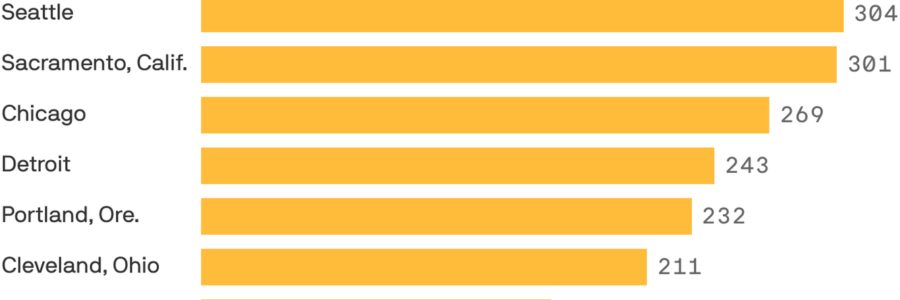
Tens of thousands of Americans have welcomed Ukrainian refugees
In the year since Russia invaded Ukraine, more than 200,000 people in the U.S. have volunteered to sponsor Ukrainians seeking refuge.
Zoom in: Seattle and Sacramento have been some of the most welcoming metro areas in proportion to their populations, according to Homeland Security data.
- New York had the largest total number of people apply to sponsor Ukrainians.
One sponsor family, based in Austin, Texas, welcomed a Ukrainian family in time to celebrate this past Christmas.
- The couple from Kyiv had held on until October before deciding to leave for the safety of their children.
- "We have to do something to change for our kids, so they will be safe," Kateryna, the mother, told Axios, reflecting on the day they decided to leave.
- They applied for the sponsorship program in the U.S. through the Welcome.us hub and within weeks were connected with Suezean and Nathan Matarazzo of Austin.
By the numbers: Over a quarter million Ukrainians have been granted entry into the U.S.
- More than 113,000 have arrived through the "Uniting for Ukraine" program, which offers two-years of humanitarian parole to Ukrainians sponsored by family, friends or total strangers.
- Some took a chance, flying to Mexico and crossing the border into the U.S. to seek asylum last spring. Others arrived with previously obtained short-term visas or were granted official refugee resettlement — a much longer process.
Zoom out: The global crisis — with more than 8 million Ukrainians now scattered throughout Europe — was a turning point for the Biden administration's approach to immigration.
- Humanitarian parole was used as a last-resort to bring in tens of thousands of Afghans following the fall of Kabul. It then became the basis of a formal pathway for desperate Ukrainians.
- Welcome.us launched its Ukraine program in April, capturing the broad American support for Ukraine.
- That same process — offering humanitarian parole coupled with stricter rejection of migrants at the border — inspired the administration's new approach to Venezuelans, Nicaraguans, Cubans and Haitians at the southern border.
Ukraine also further opened the door for average Americans to bring in and care for refugees from around the world.
- Refugee resettlement in the U.S. has been almost entirely handled by the federal government, the U.N. and a small network of NGOs. That could soon change.
- "It's opening a window to the solution at scale for what have been some really intractable humanitarian and border crises," Nazanin Ash, CEO of Welcome.us, which has served as the main hub for people looking to sponsor parolees and refugees.
What to watch: If the war in Ukraine drags on, people who have sought safety in the U.S. could lose their temporary status and face few options to legally stay.
- Humanitarian parole lasts two years. It also still takes time to get work authorizations and the private sector is not always set up to handle employees with parole, Ash said.
The bottom line: Ukrainians have left their country not to chase an American Dream, said Kateryna, who has settled with her family into their own place.
- "We go to the United States only because we are afraid for our lives, because now in Ukraine, we don't have a future. We don't have tomorrow."
- "What they're doing is a very brave thing. They're leaving everything they own, their hopes and dreams, to get the children to safety," Seuzuen said.
Source: Read Full Article